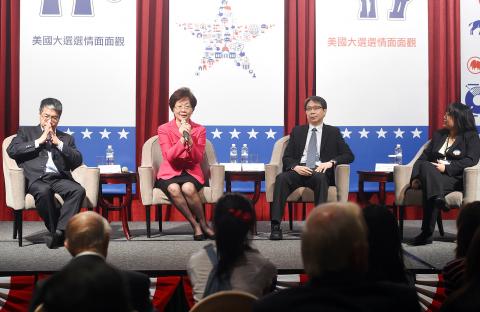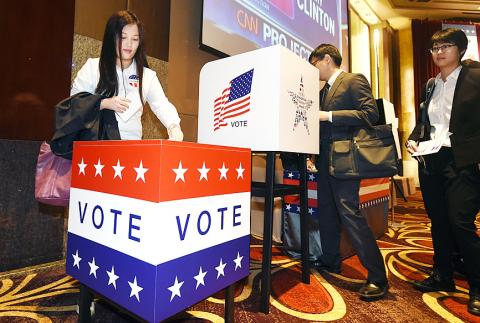US president-elect Donald Trump’s upset win drew mixed reactions from academics and non-governmental organization (NGO) leaders yesterday, from speculation about new arms sales to Taiwan to concern over Taipei’s quest to join the US-led Trans-Pacific Partnership (TPP).
A crowd of several hundred reporters, academics and NGO officials gathered for a US presidential election watch event organized by the American Institute in Taiwan (AIT) and Taiwan Democracy Foundation in Taipei, milling through a Shangri-La Far Eastern Hotel ballroom while watching broadcasts of the election.
As servers bedecked in US flag-themed costumes served refreshments, the tension in the room rose as a tight race became apparent.

Photo: Liao Chen-huei, Taipei Times
While a mock poll of participants conducted by the AIT showed a small majority would have voted for Democratic US presidential candidate Hillary Rodham Clinton, participants gave widely varying responses when asked about their perception of the consequences of the election results for Taiwan.
“In Taiwan, political hands in both parties are very familiar with Clinton’s aides, so if she were elected, they would feel more at ease,” Tamkang University professor Alexander Huang (黃介正) said. “If Donald Trump was elected, there is going to be a lot of homework not only for us, but for the whole region, and there is a lot that is hard to predict.”
Lai I-chung (賴怡忠), an executive committee member of the pan-green Taiwan Thinktank, said Taiwan-US relations would remain stable, with the possibility of some new arms sales because of Trump’s emphasis on allies’ self-defense.

Photo: Liao Chen-huei, Taipei Times
“The US’ foreign policy is not just the product of whatever the president says,” Lai said. “While it is still unclear what the content of Trump’s foreign policy will be, we will still have a strong Republican congress, as well as the Taiwan Relations Act and the ‘six assurances,’ so the basic structure of Taiwan-US relations should not change much even if Trump has some new ideas.”
“Trump has certainly made statements about East Asia that are different from traditional US policy, whether stating that South Korea and Japan could consider developing nuclear weapons or calling for East Asian countries to bear a greater part of the burden of defending themselves. However, while Japan and South Korea are definitely going to be nervous, there is also an increased possibility of further arms sales to Taiwan, with fewer of the restrictions that have been imposed in the past,” he said.
“There may be more pressure to purchase US arms, but they will not necessarily be useful weapons,” National Sun Yat-sen University political science professor Liao Da-chi (廖達琪) said, adding that Trump would likely be driven mainly by the desire to profit US firms.
The professor called for a full reconsideration of Taiwan’s policy toward the Asia-Pacific region in the face of new uncertainty about US foreign policy.
“Because Trump is a businessman without any background in politics, it is extremely hard to predict what he will do with regard to Taiwan, but he appears inclined to reduce the US’ involvement in foreign affairs,” she said. “While the Taiwan Relations Act will remain in place, presidents have substantial discretion over the extent to which they implement it.”
Other participants urged caution in predicting a potential impact, citing the geopolitical factors underpinning US foreign policy.
“We should be careful not to immediately label Trump as rash,” National Chung Hsing University Graduate Institute of International Politics professor Tsai Ming-yeng (蔡明彥) said, adding that who Trump names to his national security team would be a crucial signal of future policy direction.
“The overall alignment from the past several decades should not change, because it is the product of geopolitics, which is not something any one person can change, regardless of who is elected,” said Chang Tieh-chih (張鐵志), cofounder of the Chinese-language online publication The Reporter, while adding that the future of the TPP was uncertain because of Trump’s opposition to the deal.
“Trump said just a few days ago that Taiwan and Mexico were stealing US jobs. I am not clear why he singled us out, but the sense one gets is that all non-Americans are a drag on US economic development,” said Clarence Chou (周宇修), a director of the Campaign for Media Reform.

MAKING WAVES: China’s maritime militia could become a nontraditional threat in war, clogging up shipping lanes to prevent US or Japanese intervention, a report said About 1,900 Chinese ships flying flags of convenience and fishing vessels that participated in China’s military exercises around Taiwan last month and in January last year have been listed for monitoring, Coast Guard Administration (CGA) Deputy Director-General Hsieh Ching-chin (謝慶欽) said yesterday. Following amendments to the Commercial Port Act (商港法) and the Law of Ships (船舶法) last month, the CGA can designate possible berthing areas or deny ports of call for vessels suspected of loitering around areas where undersea cables can be accessed, Oceans Affairs Council Minister Kuan Bi-ling (管碧玲) said. The list of suspected ships, originally 300, had risen to about

DAREDEVIL: Honnold said it had always been a dream of his to climb Taipei 101, while a Netflix producer said the skyscraper was ‘a real icon of this country’ US climber Alex Honnold yesterday took on Taiwan’s tallest building, becoming the first person to scale Taipei 101 without a rope, harness or safety net. Hundreds of spectators gathered at the base of the 101-story skyscraper to watch Honnold, 40, embark on his daredevil feat, which was also broadcast live on Netflix. Dressed in a red T-shirt and yellow custom-made climbing shoes, Honnold swiftly moved up the southeast face of the glass and steel building. At one point, he stepped onto a platform midway up to wave down at fans and onlookers who were taking photos. People watching from inside

Japan’s strategic alliance with the US would collapse if Tokyo were to turn away from a conflict in Taiwan, Japanese Prime Minister Sanae Takaichi said yesterday, but distanced herself from previous comments that suggested a possible military response in such an event. Takaichi expressed her latest views on a nationally broadcast TV program late on Monday, where an opposition party leader criticized her for igniting tensions with China with the earlier remarks. Ties between Japan and China have sunk to the worst level in years after Takaichi said in November that a hypothetical Chinese attack on Taiwan could bring about a Japanese

STREAMLINED: The dedicated funding would allow the US to transfer equipment to Taiwan when needed and order upgraded replacements for stockpiles, a source said The US House of Representatives on Thursday passed a defense appropriations bill totaling US$838.7 billion, of which US$1 billion is to be allocated to reinforcing security cooperation with Taiwan and US$150 million to replace defense articles provided to the nation. These are part of the Consolidated Appropriation Act, which the US House yesterday passed with 341 votes in favor and 88 against. The act must be passed by the US Senate before Friday next week to avoid another government shutdown. The US House Committee on Appropriations on Monday unveiled the act, saying that it allocates US$1 billion for the Taiwan Security Cooperation Initiative